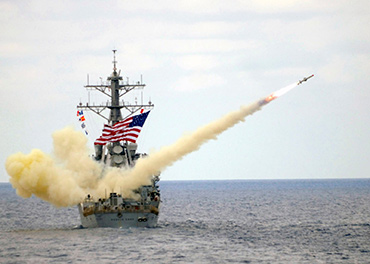
Alan Caruba
The Syrian scenario
By Alan Caruba

Arabs are particularly fond of dates with historical or religious significance. Recall the Yom Kippur War in 1973, the fourth Arab-Israeli war led by a coalition of Egypt and Syria. Like earlier wars, it ended in defeat for the Arabs.
It happens that sundown on Wednesday, September 4, marks the beginning of Rosh Hashanah, the Jewish New Year. It will be followed ten days later by Yom Kippur. The temptation to attack Israel must have many in the Middle East salivating.
Arabs have not shown any reluctance to blow each other up during their own holy month of Ramadan, nor from attacking people in mosques or even those attending funerals, so the coming week would be one of watchfulness even if events in Syria were not spiraling toward an expansion of its civil war that would include an attack on Israel.
Behind all of this is Iran. They are the puppet-masters, controlling Hezbollah in Lebanon and directing the civil war in their client-state, Syria, as the Assad regime seeks to hold onto power. Syria is supported by the Russians as well. The result so far has been 100,000 dead civilians and combatants, the latest of whom were gassed to death.
After Secretary of State John Kerry's melodramatic speech on Friday, August 30, it is clear that it was intended to prepare Americans for an attack on Syria by U.S. forces, presumably missiles and excluding the use of troops. The navy would take the lead, but what Americans are likely unaware of is the fact that Russian-made surface-to-ship missiles could retaliate and, if U.S. aircraft are also involved, surface-to-air missiles would come into play.
Following Secretary Kerry's speech, Politico.com reported that "President Barack Obama called Syria's chemical weapons attack 'a challenge to the world' and said he is considering a "limited, narrow act" against the county's regime. We're not considering any open-ended commitment," Obama said. "We're not considering any boots on the ground approach."
"I have not made any decisions," Obama said. "We have consulted with allies. We have consulted with Congress."
"Consulting" with Congress is not the same as getting authorization – a vote – as the Constitution requires, to launch an attack against Syria. It is, after all, an act of war. Even the War Powers Act, as squishy as it is, assumes a response to an attack on the homeland.
Meanwhile, the Syrians have had plenty of time to move much of their arsenal and armaments to relative safety.
The Iranians want to know what the U.S. response will be. Perhaps they recall the relative silence of the U.S. when Saddam Hussein was using gas against their troops during the eight-year war he waged against them. Perhaps they recall the muted response when Hussein gassed Kurds in the northwestern region of Iraq.
President Obama has left himself with few options because he cannot go to the United Nations Security Council where any effort to condemn Syria or give its blessings to an attack would be vetoed by Russia. After members of Congress saw the British parliament vote against participation in an attack, they are not likely to want to cast votes authorizing one. There's no coalition of nations supporting Obama though France has said it would be willing. Even the War Powers Act, as squishy as it is, assumes a response to an attack on the homeland.
This observer thinks Obama will launch an attack on Syria and it might well come on Sunday. I also think that a Syrian attack on Israel in retaliation will get little U.S. support because nothing Obama has said (his word is dirt) or done demonstrates any fondness for Israel.
A President who can turn his back on a longtime ally like Egypt's Hosni Mubarak is not likely to feel any concern about Bibi Netanyahu's little nation. Israel, however, is the only ally in the region with the capability of attacking Iran and damaging its nuclear capabilities.
The U.S. missile attack will be symbolic. If it lasts more than a day, maybe two, I would be surprised. Only the killing of Assad would change the game on the ground and he's likely to be in a secret bunker somewhere.
If a Syrian missile should hit one of our ships, the U.S. will be "all in" whether we want to be or not. Our "allies" in Syria would be a variety of terrorist groups such as al Qaeda and the Muslim Brotherhood.
Conducting a war in such a manner is idiotic, but Obama does not want to go to the up-coming G-20 meeting in Europe looking like a wimp who will not back up his earlier warnings to Assad and will do nothing given the use of poison gas. The "message" he is sending will be for Iran, not Syria.
Iran has been at war with America since 1979 when American diplomats were seized and held hostage. We are the "great Satan" and Israel is the "little Satan." As Iran moves closer to acquiring nuclear capabilities, its leaders feel emboldened.
That's how big wars begin.
© Alan Caruba
August 31, 2013

Arabs are particularly fond of dates with historical or religious significance. Recall the Yom Kippur War in 1973, the fourth Arab-Israeli war led by a coalition of Egypt and Syria. Like earlier wars, it ended in defeat for the Arabs.
It happens that sundown on Wednesday, September 4, marks the beginning of Rosh Hashanah, the Jewish New Year. It will be followed ten days later by Yom Kippur. The temptation to attack Israel must have many in the Middle East salivating.
Arabs have not shown any reluctance to blow each other up during their own holy month of Ramadan, nor from attacking people in mosques or even those attending funerals, so the coming week would be one of watchfulness even if events in Syria were not spiraling toward an expansion of its civil war that would include an attack on Israel.
Behind all of this is Iran. They are the puppet-masters, controlling Hezbollah in Lebanon and directing the civil war in their client-state, Syria, as the Assad regime seeks to hold onto power. Syria is supported by the Russians as well. The result so far has been 100,000 dead civilians and combatants, the latest of whom were gassed to death.
After Secretary of State John Kerry's melodramatic speech on Friday, August 30, it is clear that it was intended to prepare Americans for an attack on Syria by U.S. forces, presumably missiles and excluding the use of troops. The navy would take the lead, but what Americans are likely unaware of is the fact that Russian-made surface-to-ship missiles could retaliate and, if U.S. aircraft are also involved, surface-to-air missiles would come into play.
Following Secretary Kerry's speech, Politico.com reported that "President Barack Obama called Syria's chemical weapons attack 'a challenge to the world' and said he is considering a "limited, narrow act" against the county's regime. We're not considering any open-ended commitment," Obama said. "We're not considering any boots on the ground approach."
"I have not made any decisions," Obama said. "We have consulted with allies. We have consulted with Congress."
"Consulting" with Congress is not the same as getting authorization – a vote – as the Constitution requires, to launch an attack against Syria. It is, after all, an act of war. Even the War Powers Act, as squishy as it is, assumes a response to an attack on the homeland.
Meanwhile, the Syrians have had plenty of time to move much of their arsenal and armaments to relative safety.
The Iranians want to know what the U.S. response will be. Perhaps they recall the relative silence of the U.S. when Saddam Hussein was using gas against their troops during the eight-year war he waged against them. Perhaps they recall the muted response when Hussein gassed Kurds in the northwestern region of Iraq.
President Obama has left himself with few options because he cannot go to the United Nations Security Council where any effort to condemn Syria or give its blessings to an attack would be vetoed by Russia. After members of Congress saw the British parliament vote against participation in an attack, they are not likely to want to cast votes authorizing one. There's no coalition of nations supporting Obama though France has said it would be willing. Even the War Powers Act, as squishy as it is, assumes a response to an attack on the homeland.
This observer thinks Obama will launch an attack on Syria and it might well come on Sunday. I also think that a Syrian attack on Israel in retaliation will get little U.S. support because nothing Obama has said (his word is dirt) or done demonstrates any fondness for Israel.
A President who can turn his back on a longtime ally like Egypt's Hosni Mubarak is not likely to feel any concern about Bibi Netanyahu's little nation. Israel, however, is the only ally in the region with the capability of attacking Iran and damaging its nuclear capabilities.
The U.S. missile attack will be symbolic. If it lasts more than a day, maybe two, I would be surprised. Only the killing of Assad would change the game on the ground and he's likely to be in a secret bunker somewhere.
If a Syrian missile should hit one of our ships, the U.S. will be "all in" whether we want to be or not. Our "allies" in Syria would be a variety of terrorist groups such as al Qaeda and the Muslim Brotherhood.
Conducting a war in such a manner is idiotic, but Obama does not want to go to the up-coming G-20 meeting in Europe looking like a wimp who will not back up his earlier warnings to Assad and will do nothing given the use of poison gas. The "message" he is sending will be for Iran, not Syria.
Iran has been at war with America since 1979 when American diplomats were seized and held hostage. We are the "great Satan" and Israel is the "little Satan." As Iran moves closer to acquiring nuclear capabilities, its leaders feel emboldened.
That's how big wars begin.
© Alan Caruba
The views expressed by RenewAmerica columnists are their own and do not necessarily reflect the position of RenewAmerica or its affiliates.
(See RenewAmerica's publishing standards.)



















